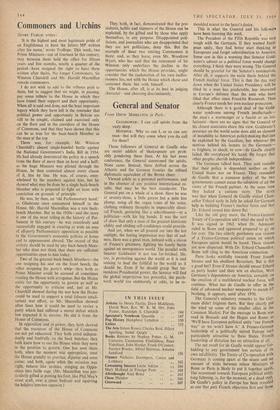Commoners and Urchins
HENRY FAIRLIE writes : 'It is the highest and most legitimate pride of an Englishman to have the letters MP written after his name,' wrote Trollope. This week, two Prime Ministers—out of fourteen in this century, they between them held the office for fifteen years and five months, nearly a quarter of the period—have resigned the right to have them written after theirs. No longer Commoners, Sir Winston Churchill and Mr. Harold Macmillan remain commoners.
I do not wish to add to the tributes paid to them, but to suggest that we might, in passing, pay some tribute to the House in which they have found their support and their opportunity. When all is said and done, not the least important legacy which they have left is the reminder that political power and opportunity in Britain are still to be sought, claimed and exercised only on the floor and in the corridors of the House of Commons, and that they have shown that this can be as true for the back-bench Member as the man at the top.
There was, for example, Mr. Winston Churchill's almost single-handed battle against the National Government's India Bill in 1934. He had already denounced the policy in a speech from the floor of more than an hour and a half; as the huge Measure was piloted through the House, he then contested- almost every clause of it, line by line. He was, of course, over- whelmed by the numbers against him, but he showed what may be done by a single back-bench Member who is prepared to fight an issue with conviction on grounds of principle.
He was, by then, an 'old Parliamentary hand,' as Gladstone once announced himself to the House. Mr. Harold Macmillan was a raw back- bench Member. But in the 1930s—and the story is one of the most telling-in the history of Par- liament in this century—he was ceaselessly and successfully engaged in creating as wide an area of all-party Parliamentary opposition as possible to the Government's economic policies at home and to appeasement abroad. The record of this activity should be read by any back-bench Mem- ber who does not think that there are sufficient opportunities open to him today.
Two of the greatest back-bench Members—the one resigning his seat on the front bench, the other resigning his party's whip—they both as Prime Minister could be accused of sometimes treating the House with arrogance. But the House exists for the opportunity to govern as well as the opportunity to criticise and, just as Mr. Churchill showed during the war how the House could be used to support a total (almost totali- tarian) war effort, so Mr. Macmillan showed after Suez how it could be used to revive a party which had suffered a moral defeat which few expected it to survive. He did it from the House of Commons.
In opposition and in power, they both showed that the resources of the House of Commons• are not yet exhausted. They both acted indepen- dently and fruitfully on the back benches; they both knew how to use ,the, House when they were in the position to govern. One has seen them both, when the moment was appropriate, treat the House grandly to gravitas, dignitas and even pietas; and both, again when the occasion was right, behave like urchins, stinging an Oppo- sition into futile rage. (Mr. Macmillan was par- ticularly gifted at putting his foot, like Phil May's street arab, over a street hydrant and squirting the helpless benches opposite.)
They both, in fact, demonstrated that the pro- cedures, habits and manners of the House can be exploited, by the gifted and by those who apply themselves, to any purpose. Disappointed poli- ticians, and journalists who are disappointed that they are not politicians, deny this. But the example of these two retiring Commoners is there; and, as they leave, even Mr. Woodrow Wyatt, who has said that the retirement of Sir Winston only underlines the decline in the opportunities which the House 'provides, might consider that the explanation of his own ineffec- tiveness lies, not with the House which chose and sustained them. but with himself.
The House, after all, is at its best in judging character--and choosing discriminately.






























 Previous page
Previous page